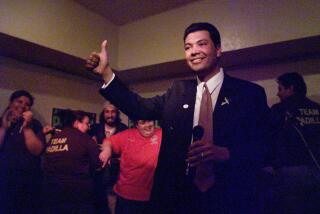California Sounds: Gaby Moreno teams with Van Dyke Parks; Carl Stone unearths some early loop-based beauty; Valley Queen rolls through the city
Gaby Moreno and Van Dyke Parks, “The Immigrants” (Nonesuch). Few scenes are as thrilling to a Los Angeles music fan as witnessing composer, arranger and longtime Southern California chronicler Parks sit in his Los Feliz home studio and enthusiastically gesticulate as he listens to a rough mix of his new collaboration with Guatemalan singer Moreno.
Parks, whose own solo work and collaborations with artists including the Beach Boys (on “Pet Sounds” and “Smile”), Joanna Newsom (“Ys”), Randy Newman, Phil Ochs and dozens more continues to define the so-called West Coast sound. He had been chatting about his time up and down Sunset Boulevard and banging on the piano earlier this year when, nearly as an afterthought, he asked whether he could share a taste of his new work with the L.A.-based Moreno.
Hell yes. He popped on “The Immigrants,” part of a long-simmering collaboration with Moreno that began in 2010 when they teamed at the Roskilde music festival in Denmark. Cranking a recorded version of the song they played, the overalls-wearing Parks danced his arms with the rhythm as his gymnastic arrangement erupted like the time-lapse blossoming of a rosebud.
Written in 1998 by the Trinidadian calypso artist David Rudder in response to the then-fresh brutalizing of Abner Louima by members of the NYPD, “The Immigrants” tackles themes that resonate in this highly charged moment in America’s history, when asylum-seeking children hoping for refuge are being intentionally separated from their parents.
“The immigrants are here to stay, to help build America / The immigrants ain’t going nowhere, they’re here for America,” Moreno sings as Parks’ brass-and-string arrangement swirls along. Moreno sings of those “fighting for a better life, fighting through the grunge” before demanding: “America remember Ellis Island, we all came here to take the plunge — I hope you understand it.”
Initially, this recording was planned for release on a forthcoming Moreno-Parks full-length album, but, according to release notes, “they opted to put this song out early in order to voice their support for those caught in the current immigration crises.” The as-yet-untitled album will be released by Nonesuch in the fall, but all money coming in from the release of this song will be donated to the Central American Resource Center of California, an immigrants-rights nonprofit.
Valley Queen, “Supergiant” (Roll Call). The title track from this Echo Park-based rock band pops with electric energy: Humming, fuzzed-out guitar tones, bass-lines that recall Kim Deal’s work with the Pixies and the voice of band co-founder/focal point Natalie Carol, which she maneuvers with the lilt of a ‘60s country singer.
Taken from its new debut album, the song finds Carol, co-founding bassist Neil Wogensen and guitarist Shawn Morones working with noted L.A. producer Lewis Pesacov (Best Coast, FIDLAR) on a grunge-suggesting song about open windows, empty bars, the face of God and our fate as “colossal, rambling astronauts.”
In the video, she sings the song across the course of a day, moving from an a.m. awakening to midday cruising with her bandmates through Highland Park, Silver Lake and Echo Park, late night aimlessness and, near the conclusion, a bathroom-mirror visual coda.
Carl Stone, “Electronic Music From the Eighties and Nineties” (Unseen Worlds). Now based in Tokyo, the experimental electronic composer carved a fascinating path through various California music scenes since his first recorded appearances in the 1970s.
A Cal-Arts student of electronic music pioneer Morton Subotnik and composer James Tenney and a contemporary of expert percussionist William Winant, Stone has worked across the decades with looped samples, MIDI technology, early desktop computing and contemporary digital production, exploring the parameters of a profoundly moving sonic universe.
The lesser-known Stone has worked with San Francisco experimentalist Z’EV and as part of the Independent Project Records posse of the mid-’80s. Stone’s looped, oft-abrasive early experiments appeared alongside the Germs and Minutemen on seminal L.A. post-punk album “Live Is Boring So Why Not Steal This Record,” and later as part of the “Dry Lungs” series issued buy New England noise label RRRecords.
This second volume of Stone works, issued by the expansive Unseen Worlds imprint, is composed of four pieces that range in length from 14 to 23 minutes. Harnessing machines including a Synclavier, rack-mounted digital delay box, Prophet 2002 sampler, MIDI-controlled Yamaha TX816 and off-the-shelf Macintosh computer, the artist constructs oft-ethereal meditations that entangle synthesized and acoustically generated frequencies until they mesh into blanket-like gusts of tone.
The 1990 composition “Banteay Srey,” which opens the collection, blends layered loops of pitched-down human vocals with echoes and low-frequency synth-lines to create a melancholy piece that even the hippest Warp Records enthusiast might mistake for a lost Aphex Twin ambient track.
The skittering, chime-suggestive tones that drive “Sonali” sound like the workings of a coked-up gamelan player, and when, midway through, Stone introduces aural tidbits from a Mozart chorale work, the piece further ascends.
For tips, records, snapshots and stories on Los Angeles music culture, follow Randall Roberts on Twitter and Instagram: @liledit. Email: randall.roberts@latimes.com.
ALSO
Experience the late Richard Swift’s pop brilliance in five of his best songs
Raymond Scott, the musical genius you probably don’t know, is getting his own L.A. festival
UPDATES:
8:50 a.m. Updated to clarify that at Cal-Arts, Carl Stone was a student of James Tenney and Morton Subotnick, and a contemporary of percussionist William Winant.
This article was originally published on July 13.
More to Read
The biggest entertainment stories
Get our big stories about Hollywood, film, television, music, arts, culture and more right in your inbox as soon as they publish.
You may occasionally receive promotional content from the Los Angeles Times.







